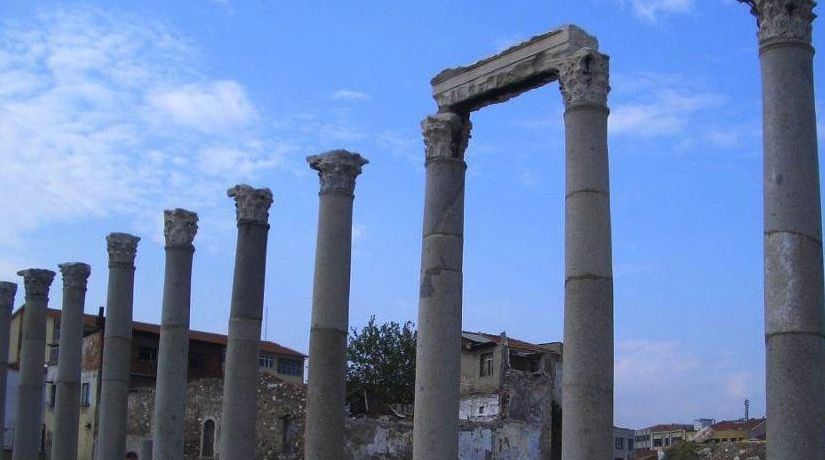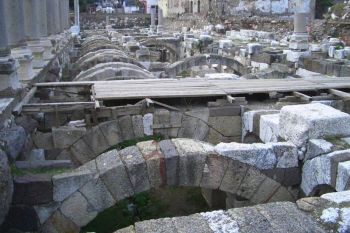What is the history of the church of Smyrna? What timeless lessons can we learn from Jesus Christ’s message to Smyrna recorded in Revelation 2?

Ruins of an agora (marketplace) from Smyrna around the second to third century (photo by David Treybig).
When John received the vision with messages to seven congregations of the Church of God in Asia Minor, he recorded Jesus saying, “‘I am the Alpha and the Omega, the First and the Last,’ and ‘What you see, write in a book and send it to the seven churches which are in Asia: to Ephesus, to Smyrna, to Pergamos, to Thyatira, to Sardis, to Philadelphia, and to Laodicea’” (Revelation 1:11).
The order of these seven cities, representing congregations of the Church of God, is that of an ancient mail route that connected these cities. For background information on these messages, see “Seven Churches of Revelation.” In this article we will focus on the city of Smyrna during the first and second centuries, what the message was and the importance of Christ’s instruction to this congregation for us today.
Similar to Ephesus, which was only 40 miles to the south, Smyrna had many visitors. Boasting an excellent harbor and the beginning of a well-traveled road to the interior, Smyrna regularly had travelers passing through it. This great trading city, founded by Alexander the Great, continues to this day as the modern Turkish city of Izmir with a population of approximately 2.8 million.
First-century Smyrna
The basement area of an agora (marketplace) of the second or third century in Smyrna (photo by David Treybig).
“On the slope of Mt. Pagus was a theater which seated 20,000 spectators. In the 23 AD year a temple was built in honor of Tiberius and his mother Julia, and the Golden Street, connecting the temples of Zeus and Cybele, is said to have been the best in any ancient city” (International Standard Bible Encyclopedia, 1939, “Smyrna”).
The church of Smyrna
Little is known of the first-century congregation that met in Smyrna. Other than the references to this church in Revelation 1:11 and Revelation 2:8, the Bible offers no additional information. Historians, however, offer some interesting insights regarding Polycarp, a student of the apostle John and the one who later became the bishop of Smyrna during the second century, and Polycrates, a younger contemporary of Polycarp who served as the bishop in Ephesus.
Two well-known historians of the early centuries, Ignatius and Irenaeus, said that Polycarp was taught by the apostle John. His link to the apostolic age is clearly evidenced in the difference between the Christians in Asia and those in Rome over the observance of Passover, one of God’s annual festivals.
Pressure to abandon Passover
While the churches in Rome had begun celebrating Easter as a replacement for Passover, Polycarp and the churches in Asia continued to observe the Passover on the 14th day of Nisan, the first month, as the Bible requires (Leviticus 23:5). This difference was quite visible since Easter always fell on a Sunday and Passover could occur on other days of the week depending upon when the 14th day fell each year.
Apparently, this difference between the churches in Rome and those in Asia continued throughout the lifetimes of Polycarp and Pope Anicetus. Later, Pope Victor of Rome moved to establish uniformity among the churches by demanding that the Asian churches forsake their practice of observing the Passover and begin observing Easter.
Passover observance upheld
The leaders of the congregations in Asia, led by Polycrates, decided that they would remain faithful to the practice they had received from the apostles of the first century. Explaining their decision, Polycrates wrote the following to Victor:
“We observe the exact day; neither adding, nor taking away. For in Asia also great lights have fallen asleep, which shall rise again on the day of the Lord’s coming, when he shall come with glory from heaven, and shall seek out all the saints. Among these are Philip, one of the twelve apostles, who fell asleep in Hierapolis; and his two aged virgin daughters, and another daughter, who lived in the Holy Spirit and now rests at Ephesus; and, moreover, John, who was both a witness and a teacher, who reclined upon the bosom of the Lord, and, being a priest, wore the sacerdotal plate. He fell asleep at Ephesus.
“And Polycarp in Smyrna, who was a bishop and martyr; and Thraseas, bishop and martyr from Eumeneia, who fell asleep in Smyrna. Why need I mention the bishop and martyr Sagaris who fell asleep in Laodicea, or the blessed Papirius, or Melito the Eunuch who lived altogether in the Holy Spirit, and who lies in Sardis, awaiting the episcopate from heaven, when he shall rise from the dead? All these observed the fourteenth day of the passover according to the Gospel, deviating in no respect, but following the rule of faith.
“And I also, Polycrates, the least of you all, do according to the tradition of my relatives, some of whom I have closely followed. For seven of my relatives were bishops; and I am the eighth. And my relatives always observed the day when the people put away the leaven.
“I, therefore, brethren, who have lived sixty-five years in the Lord, and have met with the brethren throughout the world, and have gone through every Holy Scripture, am not affrighted by terrifying words. For those greater than I have said ‘We ought to obey God rather than man.’ … I could mention the bishops who were present, whom I summoned at your desire; whose names, should I write them, would constitute a great multitude. And they, beholding my littleness, gave their consent to the letter, knowing that I did not bear my gray hairs in vain, but had always governed my life by the Lord Jesus” (Eusebius, Church History, Book V, Chapter 24).
The message to the church of Smyrna
The wording of the message to the church of Smyrna is: “And to the angel of the church in Smyrna write, ‘These things says the First and the Last, who was dead, and came to life: “I know your works, tribulation, and poverty (but you are rich); and I know the blasphemy of those who say they are Jews and are not, but are a synagogue of Satan.
“‘“Do not fear any of those things which you are about to suffer. Indeed, the devil is about to throw some of you into prison, that you may be tested, and you will have tribulation ten days. Be faithful until death, and I will give you the crown of life. He who has an ear, let him hear what the Spirit says to the churches. He who overcomes shall not be hurt by the second death”’” (Revelation 2:8-11).
Meaning of the message
From the message to Smyrna, we note several important points. First, God knew their works. Similarly, He knows our works. In fact, He even knows our thoughts (Psalm 94:11).
Additionally, God told the members of the church at Smyrna that He knew the tribulation and poverty they had suffered. And He also knew there were Jewish pretenders. Regarding this reference to those falsely claiming to be Jews, it appears that these people were the cause of much hardship for the members of the church of Smyrna.
While the apostles and members of the Church of God in the first century came in contact with many Jews, we do not know why these people claiming to be Jews at Smyrna were identified by Christ as having blasphemed and as being a synagogue of Satan.
In the following century, however, we see what might be a continuation of this hostility directed toward the Christians at Smyrna. Albert Barnes explains: “In the time of the martyrdom of Polycarp—the Jews of Smyrna were among the most bitter of the enemies of Christians, and among the most violent in demanding the death of Polycarp. Eusebius (Eccl. Hist. 4:15) says, that when Polycarp was apprehended, and brought before the proconsul at Smyrna, the Jews were the most furious of all in demanding his condemnation” (Barnes’ Notes on the New Testament, Revelation 2:9).
William Barclay in his Daily Study Bible adds that when Polycarp was martyred by being burned by fire and then stabbed to death on Saturday, Feb. 23, 155, “the Jews, even although they were breaking the Sabbath law by carrying such burdens, were foremost in bringing wood for the fire” (comments on Revelation 2:9).
Although many look at this condemnation of people claiming to be Jewish from a literal perspective, meaning these people were descendants of the tribe of Judah, there is another way to understand this point. In his letter to the Romans, Paul wrote, “For he is not a Jew who is one outwardly, nor is circumcision that which is outward in the flesh; but he is a Jew who is one inwardly; and circumcision is that of the heart, in the Spirit, not in the letter; whose praise is not from men but from God” (Romans 2:28-29, emphasis added). In this sense, all Christians regardless of their ethnic background are considered Jews, spiritually speaking.
If the reference to Jews in the message to Smyrna—people “who say they are Jews and are not, but are a synagogue of Satan” (Revelation 2:9)—is meant in this way, there is a clear correlation with what was taking place in church history. People claiming to be Christians were beginning to abandon the foundational tenets upon which the Church of God was founded. (One such foundational tenet was the observance of the Passover.) They retained the name “Christian” while abandoning the Christianity that was delivered by Jesus and established by the apostles in the first century.
The statement regarding “poverty (but you are rich)” indicates that even though the members were financially poor, they were rich in their relationship with God. Paul spoke of this concept to the members of the church at Rome saying that the Lord “is rich to all who call upon Him” (Romans 10:12, also see 2 Corinthians 8:9).
In spite of the trials the members of church of Smyrna would face, Christ urged them to remain faithful to death in the face of tribulation and poverty. History shows that there were people such as Polycarp who followed this admonition.
Relevance for today
Concluding His message to the church of Smyrna, Jesus said, “He who has an ear, let him hear what the Spirit says to the churches. He who overcomes shall not be hurt by the second death” (Revelation 2:11). Similar to His concluding words to Ephesus, Jesus again advises us to heed all of the messages given to the churches in order to receive eternal life.
This advice to Smyrna remains valid for us. We, too, must remain faithful in spite of tribulation or poverty. To remain faithful to God, we, like the people of God in Smyrna in the early centuries, will need to resist pressure to reject “the faith which was once for all delivered to the saints” (Jude 3-4).
Over the years, many of the practices of Jesus, the apostles and the first-century Church have been set aside in favor of human reasoning. An example of this is the disdain many have for the holy days of the Bible. Many today falsely reason that it is okay to worship God via humanly devised celebrations instead of on the days He ordained. For an eye-opening study, be sure to read the section: “How God’s Holy Days Reveal His Plan of Salvation.”
Once you have read this vital information, you are going to need to begin honoring God by observing His holy days if you are not already doing so. This will mark a major change in your life but don’t overly worry about how you can make this change. We are here to answer your questions and help you find congregations where you can worship God as He desires.
God has an exciting future for you if you will only respond to His instructions. Remember the timeless lessons in Christ’s message to Smyrna. Remain faithful no matter what, and don’t let detractors deter you!
Read more about the Churches of Revelation in the article “Seven Churches of Revelation.”





